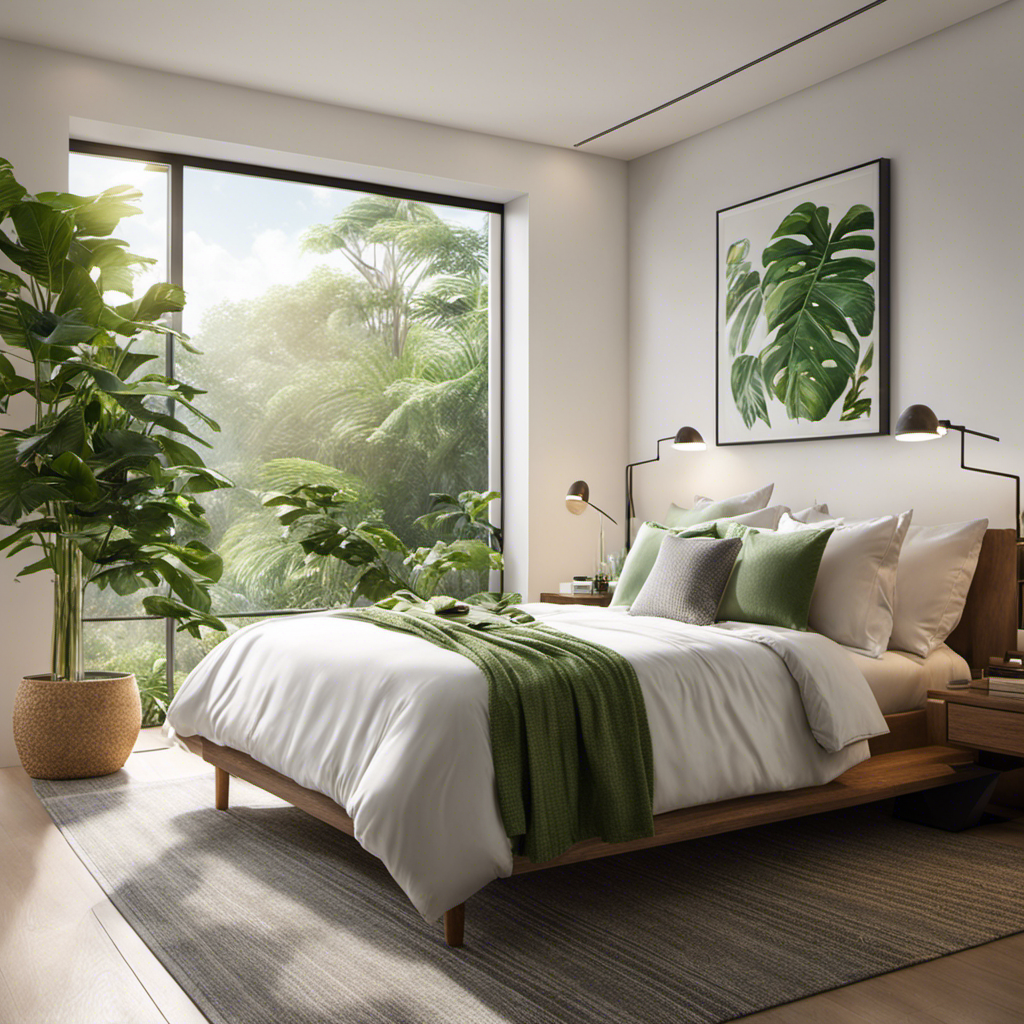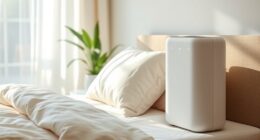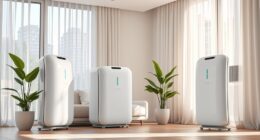As an individual who values my health and well-being, I am constantly seeking ways to improve the air quality in my living space. That’s why I was delighted to discover the remarkable benefits of air purifiers.
These devices have the power to reduce indoor air pollution, enhance respiratory health, alleviate allergies, and even improve sleep quality.
In this article, we will explore the fascinating ways in which air purifiers can positively impact our overall well-being, providing evidence-based insights and practical tips for a healthier lifestyle.
Key Takeaways
- Air purifiers remove pollutants and allergens from the air, enhancing respiratory health.
- They alleviate allergies and improve sleep quality by creating a healthier living environment.
- Air purifiers reduce indoor chemicals like volatile organic compounds (VOCs) and control odors from cooking, pets, or smoke.
- They improve cognitive function and productivity, creating a healthier environment for work or study.
The Benefits of Using Air Purifiers
Using air purifiers can significantly improve your health by removing pollutants and allergens from the air you breathe. Indoor air quality is often compromised by various factors such as dust, pet dander, mold spores, and volatile organic compounds (VOCs) emitted from household products. These pollutants can lead to a range of health issues, including respiratory problems, allergies, and even worsen existing conditions like asthma.
Air purifier technology plays a crucial role in eliminating these harmful particles from the air. These devices use filters, such as HEPA filters, activated carbon filters, or electrostatic precipitators, to capture and trap pollutants. HEPA filters, for instance, can remove up to 99.97% of airborne particles as small as 0.3 microns in size, including pollen, dust mites, and bacteria. Activated carbon filters are effective in absorbing odors, smoke, and VOCs, making the air cleaner and fresher.
By using air purifiers, you can create a healthier living environment for yourself and your family. Breathing clean air can reduce the risk of respiratory illnesses, improve sleep quality, and enhance overall well-being. With improved indoor air quality, you may experience fewer allergy symptoms, fewer asthma attacks, and a boost in your immune system.
Transition: Now that we understand the benefits of air purifiers in improving indoor air quality and reducing harmful pollutants, let’s explore how these devices can specifically help in reducing indoor air pollution.
How Air Purifiers Can Reduce Indoor Air Pollution
By having an air purifier in your home, you can significantly decrease the levels of indoor air pollution. This not only benefits your overall health but also has a positive impact on your cognitive function and productivity. Here are three ways air purifiers can improve your well-being:
-
Removing harmful particles: Air purifiers are designed to filter out pollutants such as dust, pollen, pet dander, and mold spores. These particles can trigger allergies and respiratory problems, leading to decreased cognitive function. With cleaner air, your brain can function better, allowing you to think clearly and stay focused.
-
Reducing indoor chemicals: Many household products release volatile organic compounds (VOCs), which can have adverse effects on cognitive function. Air purifiers with activated carbon filters can effectively remove these chemicals, improving the air quality and creating a healthier environment for you to work or study in.
-
Controlling odors: Unpleasant odors can be distracting and hinder productivity. Air purifiers equipped with odor-eliminating filters can remove odors from cooking, pets, or smoke, creating a fresh and clean atmosphere that enhances your concentration and efficiency.
Improving Respiratory Health With Air Purifiers
When it comes to improving respiratory health, air purifiers offer a range of benefits.
Not only do they help to improve air quality by removing pollutants and allergens from the air, but they can also significantly reduce respiratory symptoms.
Studies have shown that using air purifiers can lead to a decrease in coughing, wheezing, and other respiratory issues, making them a valuable tool for those with respiratory conditions.
Air Quality Benefits
You’ll notice a significant improvement in the air quality of your home with an air purifier.
-
Reduced allergens: Air purifiers can effectively capture and remove pet dander, pollen, and other airborne allergens that can trigger respiratory symptoms in people with allergies or asthma.
-
Cleaner air: Air purifiers use filters to trap dust, mold spores, and bacteria, providing cleaner air for you and your family to breathe.
-
Odor elimination: If you have pets, you know that they can sometimes bring unpleasant odors into your home. Air purifiers can help eliminate pet odors, leaving your home smelling fresh and clean.
By regularly maintaining your air purifier, such as cleaning or replacing the filters as recommended by the manufacturer, you can ensure its optimal performance.
With cleaner air and reduced allergens, you’ll experience a noticeable improvement in your respiratory health and a decrease in common symptoms such as coughing and wheezing.
Reduced Respiratory Symptoms
Regularly maintaining your air purifier, such as cleaning or replacing the filters as recommended, can lead to a noticeable decrease in coughing and wheezing. As someone who suffers from allergies and asthma, I have experienced the positive impact of a well-maintained air purifier on my respiratory symptoms. It’s important to understand that air purifiers are not a cure for allergies or asthma, but they can play a significant role in allergy prevention and asthma management. By removing airborne allergens and irritants from the air, air purifiers create a cleaner and healthier environment. In fact, studies have shown that using air purifiers can lead to reduced asthma symptoms and improved lung function. Here is a table showcasing some common allergens and irritants that air purifiers can effectively remove:
| Allergens/Irritants | Effectiveness of Air Purifiers |
|---|---|
| Pollen | High |
| Dust mites | High |
| Pet dander | Moderate |
| Mold spores | Moderate |
The Role of Air Purifiers in Allergy Relief
Air purifiers can help alleviate allergies by filtering out airborne allergens such as pollen and dust mites. As someone who suffers from allergies, I’ve found that using an air purifier has made a significant difference in the quality of my life. Here are three reasons why air purifiers are beneficial for allergy relief:
-
Air purifiers and pet dander: Many people are allergic to pet dander, which can cause sneezing, itching, and other respiratory symptoms. Air purifiers with HEPA filters are highly effective at capturing pet dander and other pet allergens, reducing the risk of allergic reactions.
-
Air purifiers and dust mite control: Dust mites are tiny creatures that thrive in warm and humid environments, and their droppings are a common allergen. Air purifiers equipped with HEPA filters can trap these microscopic particles, minimizing the exposure to dust mites and reducing allergy symptoms.
-
Improved indoor air quality: Air purifiers continuously filter the air, removing not only allergens but also other pollutants such as mold spores, smoke, and volatile organic compounds (VOCs). This improves the overall air quality in your home, making it easier for allergy sufferers to breathe and reducing the frequency and severity of allergic reactions.
Enhancing Sleep Quality With Air Purifiers
I’ve always struggled with nighttime allergies, which often disrupt my sleep. However, since I started using an air purifier in my bedroom, I’ve noticed a significant reduction in my allergy symptoms during the night.
Not only have my nighttime allergies improved, but I also find that my breathing is much clearer, allowing me to breathe more easily and deeply, resulting in a better quality of sleep overall.
Reduced Nighttime Allergies
You’ll notice a significant decrease in nighttime allergies when using an air purifier regularly. As someone who has struggled with allergies for years, I can attest to the positive impact air purifiers can have on improving sleep and providing allergy relief. Here are three reasons why air purifiers are effective in reducing nighttime allergies:
-
Filtering out allergens: Air purifiers are equipped with filters that can trap allergens like pollen, dust mites, pet dander, and mold spores. By removing these allergens from the air, they help create a cleaner and healthier environment for sleep.
-
Eliminating airborne irritants: Air purifiers also capture and eliminate other irritants such as smoke, odors, and volatile organic compounds (VOCs). These irritants can trigger allergy symptoms and disrupt sleep, so removing them from the air can lead to improved sleep quality.
-
Reducing indoor pollutants: Air purifiers help reduce indoor pollutants that can worsen allergies, such as indoor air pollution, chemicals from cleaning products, and fumes from cooking. By reducing these pollutants, air purifiers create a healthier indoor environment, promoting better sleep and providing allergy relief.
Better Breathing, Deeper Sleep
By using an air purifier regularly, I can experience improved breathing and deeper sleep.
Air purifiers are designed to remove pollutants and allergens from the air, creating a cleaner and healthier environment. When these harmful particles are filtered out, it can lead to better breathing by reducing the risk of respiratory issues such as asthma and allergies.
This improved air quality can also have a positive impact on sleep. Breathing in clean air allows for more restful sleep, as the body can focus on rejuvenation instead of fighting off irritants.
Additionally, air purifiers can contribute to better concentration during the day. When we sleep better, our cognitive functions are enhanced, leading to improved focus, productivity, and overall mental performance.
Moreover, by reducing airborne viruses and bacteria, air purifiers can help in boosting the immune system, keeping us healthier and more resilient to illnesses.
Air Purifiers and Their Impact on Overall Well-being
Using an air purifier can greatly improve your overall well-being. Here are three reasons why:
-
Improved Indoor Air Quality: Air purifiers are designed to remove harmful particles and pollutants from the air, such as dust, pollen, pet dander, and smoke. By filtering out these irritants, air purifiers can help reduce the risk of respiratory problems and allergies, leading to better overall health.
-
Reduced Asthma and Allergy Symptoms: For individuals with asthma or allergies, air purifiers can be particularly beneficial. By capturing and trapping allergens in the air, such as mold spores or dust mites, air purifiers can help alleviate symptoms such as coughing, sneezing, and wheezing. This can lead to a better quality of life and improved sleep.
-
Enhanced Mental and Emotional Well-being: Breathing in clean, fresh air can have a positive impact on our mental and emotional well-being. Studies have shown that poor indoor air quality can contribute to stress, fatigue, and difficulty concentrating. By using an air purifier to maintain clean air in our homes or offices, we can create a healthier and more enjoyable environment, promoting relaxation and productivity.
To ensure the effectiveness of your air purifier, regular maintenance is essential. This includes replacing filters according to the manufacturer’s instructions, cleaning the unit regularly, and keeping the surrounding area free of dust and debris. By following these maintenance practices, you can maximize the benefits of your air purifier and improve your overall well-being.
Frequently Asked Questions
Do Air Purifiers Remove All Types of Indoor Air Pollutants?
Air purifiers are effective at removing many types of indoor air pollutants. They can help eliminate common pollutants such as dust, pollen, pet dander, and mold spores. However, it’s important to note that air purifiers may not be able to remove all types of pollutants, such as volatile organic compounds (VOCs) or gases.
Different types of air purifiers have varying levels of effectiveness against different pollutants. It’s always a good idea to research and choose an air purifier that suits your specific needs.
Can Air Purifiers Completely Eliminate Allergens in the Air?
Air purifiers are effective in removing allergens from the air, but they may not completely eliminate them.
While air purifiers can capture and trap allergens such as pollen, dust mites, and pet dander, they may not be able to remove all of them due to the limitations of their filters.
It’s important to note that air purifiers can significantly reduce allergen levels, but they may not provide complete elimination.
How Often Should I Replace the Filters in My Air Purifier?
When it comes to air purifier maintenance, one important aspect is regularly replacing the filters. The frequency of filter replacement depends on various factors, such as the type of air purifier and the air quality in your surroundings.
Signs of a dirty air filter include decreased airflow, increased dust accumulation, and a decrease in the purifier’s effectiveness. Staying vigilant and replacing filters as needed will ensure that your air purifier continues to improve your indoor air quality and ultimately your health.
Are There Any Side Effects or Risks Associated With Using Air Purifiers?
Sure, there are potential dangers and long-term effects associated with using air purifiers. However, it’s important to note that these risks are minimal and only occur in certain circumstances.
For example, some air purifiers may produce ozone, which can be harmful if inhaled in high concentrations. Additionally, if not properly maintained, air purifiers can become breeding grounds for bacteria and mold.
However, by following manufacturer’s instructions and regularly cleaning and replacing filters, these risks can be mitigated.
Can Air Purifiers Improve the Smell and Freshness of Indoor Air?
Air purifiers can definitely improve the smell and freshness of indoor air. They work by filtering out harmful pollutants, such as dust, pollen, and pet dander, which can contribute to bad odors.
Conclusion
In conclusion, air purifiers are like the knights in shining armor for our health. They bravely battle against the invisible enemies lurking in our indoor air, protecting us from their harmful effects.
With their powerful filters and purifying abilities, they cleanse the air we breathe, improving our respiratory health and reducing allergies.
Like a lullaby, they lull us into a peaceful sleep, allowing us to wake up refreshed and ready to conquer the day.
So let these guardians of well-being join our homes and bring harmony to our lives.




